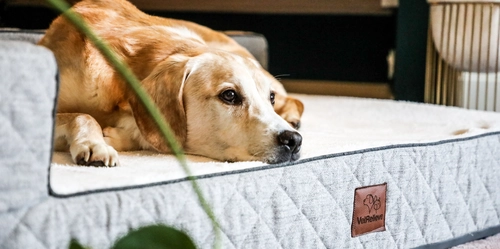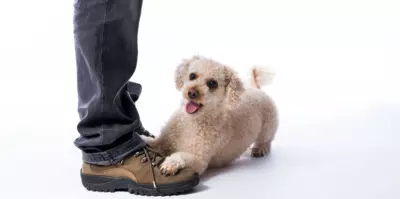Why Do Older Dogs Wake Up During the Night?
- 07 Nov 2023
- 7m read

This article is written by vet Dr Lauren Davis BVSc MRCVS, founder and director of Vet Relieve, a company dedicated to providing beds designed to meet the needs of older dogs.
How Long Do Dogs Sleep?
Did you know older dogs can be asleep up to 16 hours a day, and often are cat-napping for several more? [1]
Even young dogs are asleep for nearly half of their lives – that’s a long time in bed...
There's no one-size-fits all for this question. The amount of sleep your dog needs depends on them – just like in people, a dog's sleep needs are individual. Factors that can impact how much your dog needs to sleep can include:
Their personality and behaviour – do they like to chill out or are they a firecracker?
Their routine – for example, are you home all day interacting with them, or are you out at work?
Their average daily activity levels – how far do they walk or run in a day?
Their social interactions – meeting other dogs can be exciting and tiring!
Their breed – some dogs, especially those with flat faces, find deep sleep more difficult to enter because of breathing difficulties [2]
That means getting your dog's sleep right is really important for their health. Your dog’s sleep may be worse if they have an underlying condition, are too hot or too cold, uncomfortable, or trying to sleep somewhere with lots of disturbances.
Do Old Dogs Sleep a Lot?
The sleeping pattern of your dog will naturally change as they age [3]. Older dogs spend more of their time asleep, just like elderly people, but are also more likely to cat-nap in the day and wake up several times overnight [4].
Health can also impact your older dog's sleep. Older dogs often develop similar diseases to elderly people, including arthritis and dementia (known as canine cognitive dysfunction). Both dementia and pain from arthritis are causes of poor sleep [9,3].
Sadly, 80% of dogs over eight years old have been shown to have arthritis and, in fact, a staggering 37% of all dogs over one year old may have signs of arthritis or changes visible on x-ray.
Dementia is also very common - 28% of dogs aged 11-12 have one or more signs, rising to 68% of 15-16 year olds [7,8].
Other conditions may also cause nighttime disturbances. Many diseases such as diabetes, kidney or liver problems and urinary tract infections can lead to increased drinking which then leads to an increased need to go out for a wee overnight.
Breathing issues can lead to poor deep sleep – dogs who snore often have very narrow airways.
This disturbed overnight sleep can be hard for both dogs and their owners. Not getting enough sleep can have an impact on lots of parts of their body, including immunity, pain perception and healing [5,6]. Dogs experiencing night waking can also wake their human family, which can be very disruptive and is a common issue in families with older dogs.
How Can I Help My Senior Dog to Sleep Through the Night?
1. Make sure any conditions are being managed
If your dog is getting up more overnight, always go and see your vet so they can have a full health check. Not all conditions can be cured, but symptoms can often be managed or reduced with help from your vet and other animal health professionals.
2. Check the temperature
Just like Goldilocks, dogs like the temperature to be just right. So, if they’re moving to a cooler place overnight, it may be their bed is too hot for them. Vice versa, a cold or drafty bed isn’t much fun, so beds in chilly areas might result in your dog decamping somewhere warmer.
Older dogs need slightly warmer environments than younger dogs as warmth helps keep old joints from seizing up during sleep.
3. Location, location, location
Dogs often like company, and may enjoy a day bed somewhere where there is a lot of family activity such as the kitchen or lounge. That’s great, but don’t forget to make sure they have a bed in a quieter space as well if they want somewhere to relax. Consider noise overnight too. Can your dog hear road noise, or something inside that creates noise like a bleeping washing machine? Noisy environments can make deep sleep harder to get.
4. Use the right bed
Getting the right bed for your dog to sleep on is really important, especially if your older dog has arthritis.
Make sure the dog bed that they are sleeping on:
Allows them to get in and out easily - the bed should be high enough that they don’t have to rise from floor level to get up, but not so high they have to climb in
Lets them lie out flat - the bed should be longer than your dog, so that they can sleep on it however feels most comfortable. Measure from nose tip to tail base!
Supports them - a double-sided bed gives safety and support for their back without restricting access, which can be difficult in arthritic older dogs.
Keeps them warm - cold joints get stiffer much more easily.
Cushions their joints and relieves pressure - a poor mattress can be very uncomfortable, use orthopaedic foam to make sure they’re well supported and feel safe on the bed.
Has a non-slip base - beds that slip on the floor can make dogs feel unsafe, and slipping can cause microtraumas to joints.
Butternut Box Recommends: Vet Relieve Orthopaedic Dog Beds
If you're looking for a bed for your golden oldie, the team at Butternut Box recommend Vet Relieve orthopaedic dog beds.
Luxury mattresses and double-sided beds are available for all sizes, from small to extra-extra large. We know what you're thinking, these look more comfortable that most human mattresses, right? Alas, we wouldn't be dedicated pup parents if we didn't put our pooches comfort above our own. Guilty!
Conclusion
There’s plenty you can do to help your old dog if they are waking at night. Always start with a visit to your vet to get any health issues identified and managed, and spend time thinking about their sleep environment at home. Consider dog bed placement, in terms of noise and temperature, as well as the dog bed itself, and make sure you’re tailoring their sleep to their needs. Good luck!
References
Róbert Bódizs, Anna Kis, Márta Gácsi, József Topál, Sleep in the dog: comparative, behavioral and translational relevance, Current Opinion in Behavioral Sciences, Volume 33, 2020, Pages 25-33, ISSN 2352-1546, https://doi.org/10.1016/j.cobeha.2019.12.006.
Kinsman R, Owczarczak-Garstecka S, Casey R, Knowles T, Tasker S, Woodward J, Da Costa R, Murray J. Sleep Duration and Behaviours: A Descriptive Analysis of a Cohort of Dogs up to 12 Months of Age. Animals (Basel). 2020 Jul 10;10(7):1172. doi: 10.3390/ani10071172. PMID: 32664232; PMCID: PMC7401528.
Mondino Alejandra, Catanzariti Magaly, Mateos Diego Martin, Khan Michael, Ludwig Claire, Kis Anna, Gruen Margaret E., Olby Natasha J. Sleep and cognition in aging dogs. A polysomnographic study. Frontiers in Veterinary Science. Vol 10, 2023, https://www.frontiersin.org/articles/10.3389/fvets.2023.1151266. DOI 10.3389/fvets.2023.1151266. ISSN 2297-1769
Takashi Takeuchi, Etsumori Harada. Age-related changes in sleep-wake rhythm in dog. Behavioural Brain Research. Volume 136, Issue 1, 2002, Pages 193-199, ISSN 0166-4328, https://doi.org/10.1016/S0166-4328(02)00123-7.
Mondino A, Ludwig C, Menchaca C, Russell K, Simon KE, Griffith E, Kis A, Lascelles BDX, Gruen ME, Olby NJ. Development and validation of a sleep questionnaire, SNoRE 3.0, to evaluate sleep in companion dogs. Sci Rep. 2023 Aug 16;13(1):13340. doi: 10.1038/s41598-023-40048-1. PMID: 37587172; PMCID: PMC10432410.
Mostaghimi L, Obermeyer WH, Ballamudi B, Martinez-Gonzalez D, Benca RM. Effects of sleep deprivation on wound healing. J Sleep Res. 2005 Sep;14(3):213-9. doi: 10.1111/j.1365-2869.2005.00455.x. PMID: 16120095.
Neilson JC, Hart BL, Cliff KD, Ruehl WW. Prevalence of behavioral changes associated with age-related cognitive impairment in dogs. JAVMA 2001;218(11):1787-1791.
Melissa Smith, Michael Mendl, Joanna C. Murrell, Associations between osteoarthritis and duration and quality of night-time rest in dogs, Applied Animal Behaviour Science, Volume 253, 2022, 105661, ISSN 0168-1591, https://doi.org/10.1016/j.applanim.2022.105661.




.png)